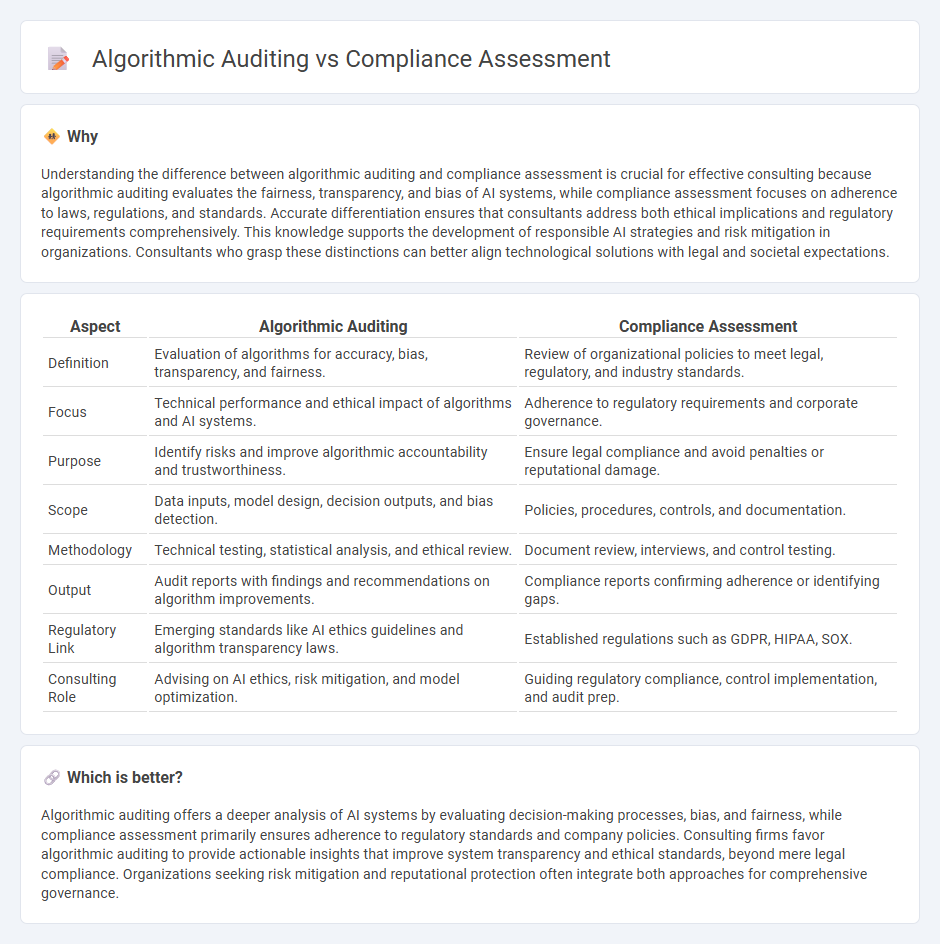
Algorithmic auditing evaluates the fairness, transparency, and accuracy of automated decision-making systems by analyzing their underlying algorithms and data inputs. Compliance assessment focuses on ensuring that organizational processes and products adhere to regulatory standards and legal requirements. Explore how blending both approaches strengthens governance and risk management in your consulting projects.
Why it is important
Understanding the difference between algorithmic auditing and compliance assessment is crucial for effective consulting because algorithmic auditing evaluates the fairness, transparency, and bias of AI systems, while compliance assessment focuses on adherence to laws, regulations, and standards. Accurate differentiation ensures that consultants address both ethical implications and regulatory requirements comprehensively. This knowledge supports the development of responsible AI strategies and risk mitigation in organizations. Consultants who grasp these distinctions can better align technological solutions with legal and societal expectations.
Comparison Table
| Aspect | Algorithmic Auditing | Compliance Assessment |
|---|---|---|
| Definition | Evaluation of algorithms for accuracy, bias, transparency, and fairness. | Review of organizational policies to meet legal, regulatory, and industry standards. |
| Focus | Technical performance and ethical impact of algorithms and AI systems. | Adherence to regulatory requirements and corporate governance. |
| Purpose | Identify risks and improve algorithmic accountability and trustworthiness. | Ensure legal compliance and avoid penalties or reputational damage. |
| Scope | Data inputs, model design, decision outputs, and bias detection. | Policies, procedures, controls, and documentation. |
| Methodology | Technical testing, statistical analysis, and ethical review. | Document review, interviews, and control testing. |
| Output | Audit reports with findings and recommendations on algorithm improvements. | Compliance reports confirming adherence or identifying gaps. |
| Regulatory Link | Emerging standards like AI ethics guidelines and algorithm transparency laws. | Established regulations such as GDPR, HIPAA, SOX. |
| Consulting Role | Advising on AI ethics, risk mitigation, and model optimization. | Guiding regulatory compliance, control implementation, and audit prep. |
Which is better?
Algorithmic auditing offers a deeper analysis of AI systems by evaluating decision-making processes, bias, and fairness, while compliance assessment primarily ensures adherence to regulatory standards and company policies. Consulting firms favor algorithmic auditing to provide actionable insights that improve system transparency and ethical standards, beyond mere legal compliance. Organizations seeking risk mitigation and reputational protection often integrate both approaches for comprehensive governance.
Connection
Algorithmic auditing systematically evaluates algorithms to ensure transparency, fairness, and accuracy, while compliance assessment measures adherence to legal and regulatory standards in algorithm deployment. Consulting services integrate these processes to identify risks, rectify biases, and verify that algorithms meet industry-specific compliance requirements. This connection enhances ethical AI implementation and mitigates potential legal liabilities for organizations.
Key Terms
Compliance assessment:
Compliance assessment systematically evaluates an organization's adherence to regulatory standards, policies, and legal requirements, ensuring operational, financial, and procedural integrity. It involves objectives such as risk reduction, verification of controls, and documentation for audits, leveraging frameworks like ISO, GDPR, or SOX. Discover more about how compliance assessments safeguard business operations and enhance regulatory trust.
Regulatory Standards
Compliance assessment evaluates adherence to regulatory standards by reviewing policies, procedures, and documentation to ensure legal and industry guidelines are met. Algorithmic auditing focuses on examining the design, implementation, and outcomes of AI models to detect biases, fairness issues, and compliance with ethical and legal frameworks. Explore the distinctions and practical applications of both methods to strengthen regulatory compliance and AI governance.
Risk Management
Compliance assessment evaluates adherence to regulatory standards and internal policies to mitigate legal and operational risks. Algorithmic auditing examines AI systems for biases, fairness, transparency, and potential ethical risks, emphasizing model accuracy and accountability. Explore detailed methodologies and tools to enhance your organization's risk management strategy in evolving regulatory landscapes.
Source and External Links
Compliance Assessments - CampusGuard - A compliance assessment evaluates and verifies if an organization is adhering to applicable laws and regulations through documentation review, interviews, and procedure testing to identify non-compliance issues and recommend remediation.
Compliance Risk Assessment [5 Key Steps] - Hyperproof - Compliance assessment involves understanding current operations, mapping risk contact points, and evaluating controls to identify gaps and improve compliance effectiveness.
Best 9 Compliance Risk Assessment Tools for 2025 - Centraleyes - Effective compliance assessments use technologies like AI, continuous monitoring, dynamic risk scoring, and scenario analysis to provide real-time, accurate risk evaluations and improve organizational compliance.
 dowidth.com
dowidth.com